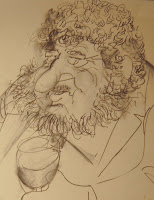 By Dewitt H. Parker Professor of Philosophy in the University of Michigan
By Dewitt H. Parker Professor of Philosophy in the University of Michigan
OK, as far as book reviews go, I've decided to opt for short and sweet. This guy Parker knows his stuff; and he’s a pretty good writer too. The Principles of Aesthetics mightn’t appeal to everyone, but Dewitt Parker knows how to use words to draw even hesitant readers into his world; he shows them another dimension of art and beauty.
This book got me in, and kept me engaged. Amazing really because when it comes to art criticism, I’ve got to admit I’m a hard nosed sceptic. The topic usually gets me a bit hot under the collar. But Parker managed to put out the fire and I was engrossed. Art criticism probably has a limited audience. I think that many people are like me and think that describing art, and its multitude of applications, is a difficult thing to do; and few do it all that well anyway.
I guess they’re right, but if the work is tackled by someone who really knows the subject, and they have a good command of the written word, then it makes the task easier. Readers then find the concepts are easier to understand. I often say, describing art, is like trying to explain how a woman thinks. It’s a challenge.
Parker's work puts many art theorists to shame. His style has incredibly easy and his prose are superb. I’ve noticed that some people get uptight when they’re told they should observe Art in a certain way. I’m one of them. But Parker has produced a work that will help to promote understanding of a topic many people avoid. His writing style is pretty near perfect (I wish I could write as fluently as him). He examines a wide range of Art topics and dissects them like a brain surgeon. Even if Art isn’t your thing, I recommend this book to you anyway. I’m sure you’ll enjoy the author’s style, grace and intelligence. It’s a prose treasure, because it demonstrates the real meaning of good writing.
Not only is Mr. Parker is a great writer and a great thinker, he’s an Art sage. If you’re hoping to find some wise comment on amorphous and experimental themes that come under the heading of modern art, you’ll be disappointed. I recon Parker was pretty smart not to tackle this genre. I think he avoided the whole scene because he knows it’s mission impossible at the best of times, and taking it on usally sends a sane human stark raving mad. No, Parker understood boundaries, and he stayed within them. He’s a classical art guru so he kept to what he knows best.
He’s a philosophical master, who speaks with authority and genuine insight on how mediums of expression should be viewed and understood; even by the novice. But just remember if you want to learn about the inner workings of modern art, this is not the book for you.
It’s more of an academic outlook on how classical and pure Art ought to be appreciated. There’s nothing experimental going on between these covers. D.H. Parker will guide the beginner, the experienced, and the expert through the amazing world of Art appreciation. He’ll open doors and windows to let fresh air in, to clear the mind. He will help the reader gain a true unadulterated understanding of Art.
Now I’ve said all the nice stuff about Parker, I’m going to get out my hatchet and go for the jugular. I totally disagree with his view that writing is the lowest form of Art and expression. I’ll defend writing as a high art form with passion. And I can back up my argument with the statement that if Parker didn’t have good writing skills, then all his art knowledge would be limited to a very small audience, and would be lost pretty quickly.
Writing has allowed Parker’s ideas to live on. Writing has made them immortal (well almost). How can the man condemn the very thing that has made it possible for him to reach a world wide audience? Art is Art, and its beauty is unmistakably clear. But I look forward to the day when an Art critic; whether he’s a Professor of Philosophy at the University of Michigan, or anywhere else, can admit that writing is a HIGH art form.
Why do so many academics say that writing is merely the use of words? Hey tell that to Shakespeare. Why don’t you decide for yourself? You won’t be disappointed if you invest the time in this book. And I can guarantee it will change you.
http://www.globusz.com/ebooks/Aesthetics/index.aspReview by Christian Crescente

 In the Globusz catalogue, I've spotted an interesting read – Parched Seas, by Ian Sharp – an account by a guy who did just what I'd once dreamed of.
In the Globusz catalogue, I've spotted an interesting read – Parched Seas, by Ian Sharp – an account by a guy who did just what I'd once dreamed of.
